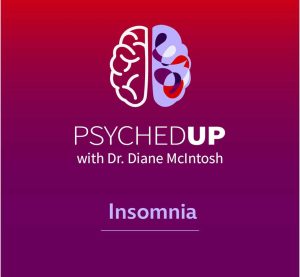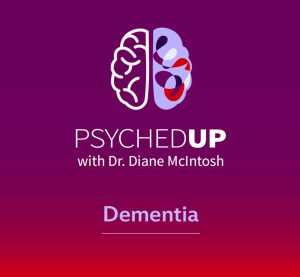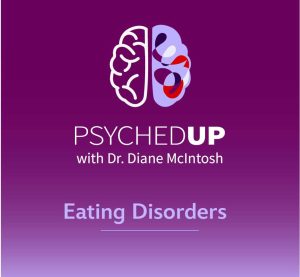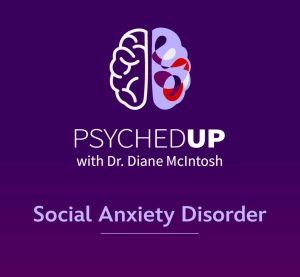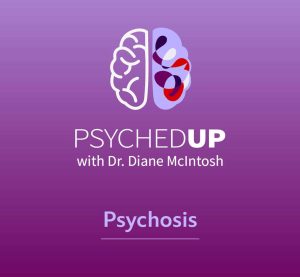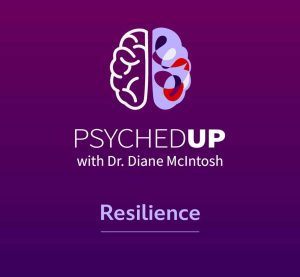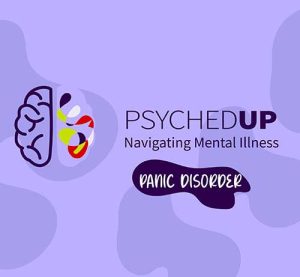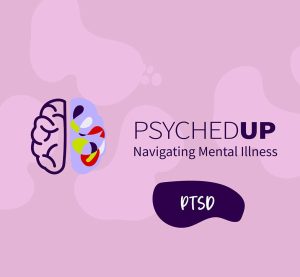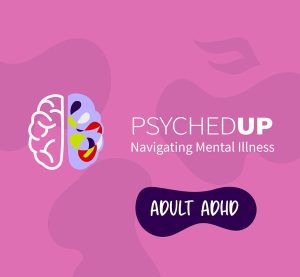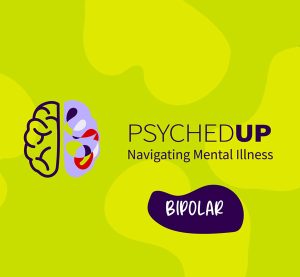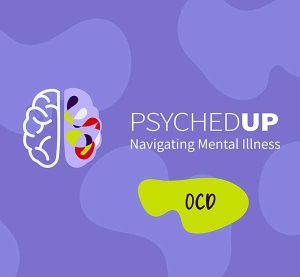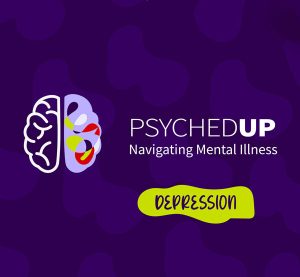
S2 Episode 4: This is Eating Disorders Transcript
At just 10 years old, Cedar walked into her doctor’s office asking for weight loss recommendations, despite being dangerously underweight. Her perception of herself, together with her desperate need for control, marked the beginning of a decade-long battle with anorexia nervosa.
In this episode of PSYCHEDUP, Dr. Diane McIntosh pulls back the curtain on eating disorders, exposing how these devastating illnesses have little to do with food and everything to do with control and trauma.
Listen to This is Eating Disorders on your favourite platform:
Podcast Transcript:
Diane: Eating disorders, they’re incredibly destructive.
Cedar: I have been hospitalized three times where I am at the risk of sudden death and I’ve had to have had a feeding tube and not be able to get up from my bed for weeks. And so that is something where I had to face, oh my gosh, like I am in so deep here.
Diane: That’s our guest, Cedar. She lives with an eating disorder. It impacts a person’s self-concept and their experience of shame.
Cedar: The thoughts that I have, it feels like my own brain is bullying me, triggering me to feel a ton of shame and have thoughts like I don’t deserve to eat.
I don’t deserve happiness, and if I’m not able to give in to these eating disorder urges, I’m weak. The thoughts feel almost abusive a lot of the time.
Diane: Imagine having thoughts that are so strong, they make you ignore your hunger to the extent that your body breaks down or drive you to rid yourself of the food you eat. These are eating disorders.
Diane: We’ll dig deeper into what eating disorders are, how they’re diagnosed, and how they’re experienced. We’ll also talk about the challenges supporters face as they help to navigate these very challenging illnesses.
As a psychiatrist, I want anyone experiencing any mental illness to be able to hear these stories and know there is a path ahead. My goal is to educate, de-stigmatize and inspire.
I’m Dr Diane McIntosh. Welcome to PSYCHEDUP!
Anorexia nervosa, binge eating disorder, bulimia nervosa- these are the most common of what are known collectively as eating disorders. They are mental illnesses associated with a disturbance in an individual’s eating behaviors. But while the relationship with food is the most obvious symptom, it’s only one aspect of what are very complicated disorders.
Many, if not most, people, at some time in their life, will have concerns about their diet, their body shape, weight and appearance. But up to 9% of women and 4% of men, at some time in their life, will become completely focused on weight loss, body weight or shape, and controlling their food intake.
For Cedar, it started at a young age.
Cedar: I’ve had my eating disorder for over a decade now. I was diagnosed when I was 10 years old and at the time I wasn’t even aware of what an eating disorder was, but I was not eating, over exercising, and I was in a place where I was in a bit of denial.
Diane: Anorexia is a medical term- it refers to a symptom- it’s a lack of or loss of appetite for food. It’s not uncommon for people who are suffering from cancer, depression or other medical disorders to experience a loss of appetite or anorexia.
Now anorexia nervosa is not a symptom. It’s a disorder- a diagnosis- characterized by restricting food intake that leads to inappropriately low body weight, typically accompanied by an intense fear of gaining weight and persistent behaviours that interfere with weight gain.
People with anorexia nervosa, they’re hungry, but they avoid the intake of calories to prevent weight gain. They usually have a highly distorted perception of body weight and their self-image is excessively influenced by their weight.
Cedar fits this description.
Cedar: Even though I was underweight, I wanted to see my doctor to see if there’s anything she would recommend for weight loss.
Diane: Cedar wasn’t seeing her body as it really was, but she still had the sense that she couldn’t talk about it openly.
Cedar: Part of the disorder is just wanting it to be so secret and I insisted on going into the doctor on my own and hiding this from my parents.
Diane: Thankfully, her doctor knew immediately – Cedar needed help.
Cedar: My doctor was like, this is wrong. And yeah, I just, my self perception was completely warped.
Diane: For those who have anorexia nervosa, their weight completely dominates how they see themselves. Often like Cedar, thinking they’re overweight, even when they’re dangerously thin.
For many patients, it’s not really about food or their weight.
Cedar: I guess it’s like not eating, and exercising, and these things are a way to cope with those emotions and to feel like I have something under control when things in my environment feel so chaotic. It’s something for me to hyperfocus on and it in a warped way makes me feel like I’m working towards an accomplishment or a goal and that’s
kind of where it gets warped is it feels like it’s increasing my self-esteem, but it is fully doing the opposite.
Diane: Like all mental illnesses, anorexia nervosa can be experienced differently by every individual. While most people will appear thin, not everyone is- some may not look thin or even look overweight, but they’ve actually lost weight or failed to gain needed weight.
For some, their weight loss is accomplished primarily through restricting food intake, whether through dieting, fasting, or excessive exercising.
Others with anorexia nervosa have the binge-eating/ purging type, which means they eat excessively and then purge themselves of those calories through self-induced vomiting, laxative use or diuretics.
If left untreated, the weight loss associated with this disorder can pose a high risk of serious physical harm or even death. In fact, anorexia nervosa has the second-highest death rate of any mental illness, mostly due to heart conditions and suicide.
Luckily for Cedar, she started treatment as soon as her doctor realized what was happening.
Cedar: So once I was diagnosed, I was assessed at the hospital and there’s physical assessment where they are checking your heart and everything. And mine was weak and I was having a lot of physical things going on for me that I hadn’t paid attention to because I was so sucked into these thoughts and the disorder and afterwards I had to talk about what was going on for me. And I remember trying so hard to keep things a secret and to deny that this was going on for me. But a big part of going to the hospital was trying to get rid of that secrecy and really pushing me. And so I was both finding out how I was physically harming my body, but also just how many disordered thoughts were going on in my head. I was like, whoa, this is exactly what’s happening for me. And I was able in that moment, in the therapy office to kind of put things together and think, oh, I am deep in this. Not only physically, but mentally too.
Diane: She really was.
Unfortunately, eating disorders, can take over lives and be really difficult to overcome. Because even though Cedar was finally able to talk about it and give it a name, she was also really scared.
Cedar: I was so set on kind of coping this way and I had this thought that was strong. Like, I just, please don’t take this away from me because this is numbing a lot of feelings I don’t want to feel.
Diane: It’s really important to know that the behaviors brought on by anorexia nervosa, these are not choices. The disorder is not rooted in food or looking a certain way, although those things can play an important role. It’s really a complicated and dangerous disorder – that has so much to do with personal control.
I think Cedar does a fantastic job of describing what it’s like for her.
Cedar: The thoughts that I have, it feels like my own brain is bullying me, triggering me to feel a ton of shame and have thoughts like I don’t deserve to eat.
I don’t deserve happiness, and if I’m not able to give in to these eating disorder urges, I’m weak. The thoughts feel almost abusive a lot of the time.
Diane: And, they’re very hard to ignore.
Cedar: I will come up with a plan to suppress my hunger so I can starve myself or make myself throw up or doing excessive exercise because that is able to quiet down the voice.
And these behaviors, they make it so I don’t have to feel those emotions as intensely because starving myself, making myself throw up, the exercise, it actually gives a bit of dopamine and obviously is horrible, but my body feels like that gets rid of how uncomfortable it is to be in my head
And big part of the disorder too is that after these thoughts, it’ll say to me, this is the only thing that will make you feel better and you have to do this. So it’s just, there’s just a lot of force and it feels very hard to ignore those urges when I feel them come up.
Diane: Cedar has anorexia nervosa, but there are two other eating disorders I’d like to highlight.
Bulimia nervosa is associated with recurrent episodes of binge eating or eating an unusually large amount of food at one time, usually within a few hours.
The binge eating is followed by self-induced vomiting or other behaviours to compensate for the large caloric intake, like excessive exercise or medication mis-use.
Episodes of binge and purge usually occur at least once a week over a 3-month period but for many, they can happen as often as several times a day. Those struggling with bulimia commonly have a normal body weight or can be overweight.
Similar to bulimia, binge eating disorder involves recurrent episodes of binge eating that feels really out of control- they can’t stop themselves or control the amount they’re taking in. Typically, they don’t feel hungry when they’re eating, and they eat much more rapidly than usual, to the point of feeling uncomfortably full – but then after the binge, they often feel really awful, disgusted or guilty. Unlike bulimia nervosa, people with binge eating disorder do not purge after a binge.
The urges of every eating disorder, they’re extreme. So extreme in fact, that Cedar’s life has been at risk. More than once.
Cedar: I have been hospitalized three times where I am at the risk of sudden death and I’ve had to have had a feeding tube and not be able to get up from my bed for weeks. And so that is something where I had to face, oh my gosh, like I am in so deep here.
Diane: It’s not where many young people expect to find themselves. But Cedar has been struggling with the disorder almost constantly since she was diagnosed. She’s now 22 years old.
Cedar: When I’ve been hospitalized, I’m in a wheelchair, and so my freedom and autonomy is completely taken away from me and I am faced with “this is actually where the disorder leads me”.
Diane: And it’s also really hard on relationships.
Cedar: A huge part of this disorder is you, you do want to hide it from people and so. There’s dishonesty, which creates trust issues, particularly with my parents or with relationships that I have been in. It has affected every single aspect of my life, and yet it tries to convince me that it’s the only thing that’ll make me happy.
Diane: Cedar feels like she’s been left behind.
But, there is hope. There’s always hope. With proven treatment, people with anorexia can return to a healthy physical state and develop more-balanced eating habits. They can also reverse some of anorexia’s most serious medical and mental health complications.
And a big part of treatment is education. If you or someone you know is struggling with an eating disorder, please talk to your health care provider. We also have information in the show notes. There are resources there and a link to my website where there’s a downloadable PDF.
Eating disorders, they’re scary, and incredibly difficult to deal with, but you’re never alone.
Diane: This seems like the perfect time to welcome my friend and colleague, Dr. Randy Mackoff. As you’ll remember, Randy is a PhD psychologist and an expert in talk therapy, while I, as a psychiatrist, tend to focus on prescribing medications for mental illness. So Randy, so good to have you back in the therapist chair.
Randy: So great to be here, Diane.
Diane: As you know, Randy, eating disorders can be really complicated to treat when you have someone in your practice who’s dangerously thin or you know they’re partaking in extreme eating behaviors, where do you start?
Randy: Yeah. You know, it, it, it is not an arm wrestle situation. You’re not going to arm wrestle somebody out of that. It’s really trying to understand what is causing the psychological inflexibility and what is also interfering in, in many respects with the self-acceptance. And what happens, I estimate, is that the, the psychological inflexibility leads to this over-focused need for control or rigid thoughts on self-worth being tied to diet, fear of gaining weight or this thinness. And so their general value system of, for example, having great interpersonal relationships, being able to go swimming with friends and having a rich experience. This becomes avoided and then they become, the individual becomes inflexible, originally focused on body image.
In my clinical practice, sometimes it is beyond what I can actually deal with as a psychologist in my office. And so I talk and, and guide them through getting proper treatment from people who specialize in this area. And sometimes that starts off on an individual basis and then leads to group interventions, and then meetings with psychiatrists and with other individuals who can be of great assistance in helping the individual.
Diane: Can you speak for a second about your thoughts on the impact of social media on eating disorders? I know that’s a big topic, but just, just touch on your general thoughts on that.
Randy: Yeah. You know, I think some of the societal influences, I think, uh, exacerbate and worsen eating disorders.
I’m somewhat reluctant to say that they’re exclusively the cause of eating disorders. ‘Cause again, the cause is so complex and I think if we isolate it to one cause that becomes somewhat of a blame situation as opposed to recognizing the multitude of factors. But societal factors and the idealizing of thinness, the advertising community in their approach to selling clothes or, or diet products or any of these types of things. I think that this has an impact on the way some people view themselves and also how it influences their eating and their image of themselves. So it’s a big factor, and we’ve known this for a long time, even before this idea of social media. We just knew from advertising that this was contributory.
I think it was probably overemphasized in the early days because we didn’t have a really good understanding of the biology. But we do now have a better understanding of the biology, which I think, Diane, is like right up your alley in expertise, but at the same time, we have still those societal contributions.
And I’m just wondering if you could talk a little bit about the medications as they pertain to eating disorders.
Diane: Well, except for binge eating disorder, for anorexia nervosa or for bulimia nervosa, there are no specific medications for those disorders. But as you know well, most people who have anorexia nervosa or bulimia nervosa also have another disorder. They can struggle with depression or anxiety or OCD. There are all of the other psychiatric disorders that also make individuals who have eating disorders vulnerable.
So what’s important to know is as a psychiatrist, as a family doctor, we need to look for those, what are called comorbidities or additional disorders, the coexisting disorders, and they absolutely must be treated. It’s already difficult enough to do your work Randy, with someone who has an eating disorder, they have a really challenging path, and if their mood or anxiety symptoms are not managed well, if their mood is not stabilized, if they have psychotic symptoms that aren’t managed, they are not able to do the psychological work that is absolutely critical for an individual who has an eating disorder. We do know that binge eating disorder, because it’s an impulse control disorder, there are actually medications that can be really helpful in managing that impulse control.
We have one that actually has an indication, Liz Dexamphetamine, that can help, and it’s actually a treatment for ADHD. And people who have ADHD also have impulse control issues, but there are other medications that we’ve used for years before.
Otherwise, for other eating disorders, any medication is really focused on the comorbid symptoms of anxiety, depression, or whatever other psychiatric disorder is ongoing.
Randy: Fantastic. Yeah. You know, I just was dealing with a situation myself, a patient who came in, uh, we spent quite a bit of time. I learned of eating disorder and I, you know, they weren’t aware that they were suffering from depression and they were not aware that they had a ADHD and I referred them back to their family doctor and they received treatment for both and currently they are not having difficulties with their eating disorder. If I’m not mistaken, it’s very much in keeping with what you were just talking about.
Diane: A hundred percent Randy, I think that we treat what we can and if a depression or anxiety symptoms are severe enough, it’s appropriate to treat with medication, two things happen. All of the disorders usually get a little bit better, which is good. The part two of that is treating the depression and anxiety symptoms or whatever psychiatric symptoms I’m treating from a medication perspective often help that individual, their brain, to be more able to engage with you or you know, their excellent psychologist on the cognitive work that needs to be done on the therapy work that needs to be done.
Your job is hard. Learning new cognitive skills, learning CBT, it requires you to be able to think, to remember, to practice, and that requires a brain that’s well enough to be able to do that work.
Randy: Absolutely, and that’s why often a combination of medication and psychological treatment is so powerful. Most definitely.
It’s really important that people get away from blame.
It’s important that parents get away from blame, and it’s important that we create supportive, nurturing environments to help people with whatever difficulties they’re experiencing.
Diane: So Randy, you brought up something that I think is so critical, which is that family members, loved ones, the supporters of someone, especially for someone who has anorexia nervosa or bulimia nervosa. Anorexia often starts very young. Our guest was 10, right? So the family dynamic is absolutely impacted.
Parents feel guilt, they feel shame sometimes.
So it’s absolutely critical for the entire family to be considered in any psychological approach. It might not be that they have to be in every therapy session, but maybe separate work for those family members themselves. Absolutely essential in my mind.
So, it’s really important for everyone to know there are treatments available and great programs. Now, sometimes it takes time to access those programs, maybe even months, but I think we both encourage people. Please don’t give up. See your healthcare provider.
Be open to trying every option available to you. I know patience is really difficult when you’re suffering, but there is always a path ahead. So as always, it is such a pleasure to speak to you, Randy. I always learn from you and I really appreciate your time.
Randy: Oh, well thank you Diane.
Diane: We know there are so many misconceptions and misunderstandings about mental illness. So in every episode, I wanna share a snippet of something I think is really important. I call it my shrink wrap.
Every mental illness can be experienced by both men and women. Some are more likely to occur in women. For instance, depression is twice as likely to be diagnosed in a woman than a man. Other disorders like schizophrenia or bipolar one disorder occur equally between the sexes. Some disorders have always been considered male dominated, like ADHD, but we’ve learned that they occur in both genders, just that their presentations are different. Boys tend to be more rowdy and, and frustrate the teacher, so they’re more likely to have that diagnosis made.
The same is true for eating disorders. They’ve always been considered female illnesses, but in fact, men can experience every type of eating disorder.
So I think it’s really important that we move away from the concept of sex specific disorders and focus on the symptoms we see and center our treatment on each individual, irrespective of their gender.
So let’s get back to Cedar, she’s done a lot of work to get better.
Cedar: So this being cognitive behavioral therapy to target those really warped thoughts that I have, and also doing trauma therapy and getting to the root of why I feel like I need to do this and why this kind of developed in me because it really at the end of the day has nothing to do with food.
That’s why treating it is so difficult.
Cedar: I am still struggling. However, I am still in therapy and having regular appointments with my doctor and actually I am on a wait list for treatment and that was coming from me, which I see as really a lot of progression because if I’m being honest, most of the time when I’ve gone into treatment or into the hospital, it’s been for other people and I think becoming aware of just how much that this eating disorder has taken away from me. And I think as much as I’m struggling, that also feels like I’m in a better place. And I feel like there’s more hope for recovery because it’s something that I am choosing for myself.
Diane: Cedar, we wish you all the success and happiness in the world. Thank you so much for coming on the show and sharing this incredibly difficult side of your life.
If you or anyone you know are struggling with an eating disorder, please reach out for help. I’ve put some links in the show notes as resources. Use and share anything that you think would be helpful.
I’m hoping this show helps as many people as possible. To help us do this, please follow and rate the show. Leave a comment too, because that helps other people to find us.
Our producer is Tori Weldon, with consulting by Steve Pratt and sound design and our original theme song written by Mark Angly of Square Wave Sound.
Until next time. I’m Dr Diane McIntosh, thanks for listening to PSYCHEDUP.

